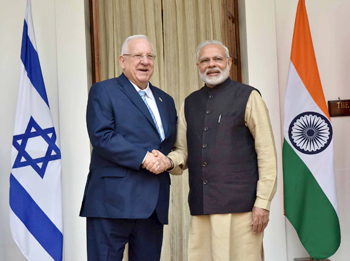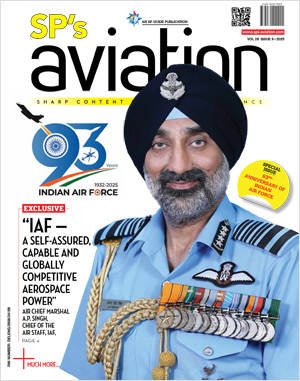INDIAN ARMED FORCES CHIEFS ON OUR RELENTLESS AND FOCUSED PUBLISHING EFFORTS

The insightful articles, inspiring narrations and analytical perspectives presented by the Editorial Team, establish an alluring connect with the reader. My compliments and best wishes to SP Guide Publications.

"Over the past 60 years, the growth of SP Guide Publications has mirrored the rising stature of Indian Navy. Its well-researched and informative magazines on Defence and Aerospace sector have served to shape an educated opinion of our military personnel, policy makers and the public alike. I wish SP's Publication team continued success, fair winds and following seas in all future endeavour!"

Since, its inception in 1964, SP Guide Publications has consistently demonstrated commitment to high-quality journalism in the aerospace and defence sectors, earning a well-deserved reputation as Asia's largest media house in this domain. I wish SP Guide Publications continued success in its pursuit of excellence.
- A leap in Indian aviation: Prime Minister Modi inaugurates Safran's Global MRO Hub in Hyderabad, Calls It a Milestone
- All about HAMMER Smart Precision Guided Weapon in India — “BEL-Safran Collaboration”
- India, Germany deepen defence ties as High Defence Committee charts ambitious plan
- True strategic autonomy will come only when our code is as indigenous as our hardware: Rajnath Singh
- EXCLUSIVE: Manish Kumar Jha speaks with Air Marshal Ashutosh Dixit, Chief of Integrated Defence Staff (CISC) at Headquarters, Integrated Defence Staff (IDS)
- Experts Speak: G20 Summit: A Sign of Global Fracture
Visit of Israeli President – cementing ties
 |
By Lt. General P.C. Katoch (Retd) Former Director General of Information Systems, Indian Army |

Reuven Rivlin, at Hyderabad House, in New Delhi on November
15, 2016
The eight-day visit to India in November by President Reuven Rivlin of Israel further cemented India-Israel bilateral relations. His visit was the first one by an Israeli President after 1996 when President Ezer Weizman had visited India. Arriving in Mumbai with a large delegation of businessmen, academicians and defence officials, Rivlin also paid respects at the sites of the 2008 Mumbai terror attacks including attending a memorial service for six Jewish nationals killed in Chabad House during the terror attacks.

Reuven Rivlin, at the joint press briefing, at Hyderabad House,
in New Delhi on November 15, 2016
At New Delhi, he met Prime Minister Narendra Modi, External Affairs Minister Sushma Swaraj and visited sites of several joint projects between the two nations, besides joining President Pranab Mukherjee in opening an agro-tech conference in Chandigarh. President Rivlin visited Punjab, Haryana, Uttar Pradesh and Maharashtra, besides New Delhi. In UP and Haryana, Rivlin took stock of Indo-Israel collaboration in agriculture and water desalination. Welcoming President Rivlin, Prime Minister Narendra Modi highlighted following salient issues: 2017 will be celebrated as 25 years of the establishment of full diplomatic relations between India and Israel; bilateral engagement is multi-dimensional including in fields of agricultural productivity and efficiency, research and innovation, science and technology for benefiting society, trade and investment, defence and security, cultural and tourism links, promoting educational exchanges, and; both sides would work to counter terrorism, radicalism and extremism even as they are cooperating in areas such as agriculture and water resource management. Both sides agreed to take “practical and specific” measures such as cyber-security cooperation and agreed to expand defence ties. President Rivlin, highlighted possible manufacturing and production partnerships in the defence sector. Rivlin's delegation included officials of top Israeli arms manufacturing companies and senior government officials dealing with matters relating to defence.

Reuven Rivlin, at the joint press briefing, at Hyderabad House,
in New Delhi on November 15, 2016
So, there would have been focused deliberations on defence cooperation, kept largely under wraps for understandable reasons. However, during President Rivlin’s visit, MoD has signed a final US$400 million contract with Israeli Aerospace Industries for importing 10 x Heron TP UCAVs. Israel's ambassador to India Daniel Carmon had earlier stated that Israel has plans for fresh joint ventures and technology transfers in developing weapons systems and ensuring implementation of Modi's Make in India initiative in the defence sector. In July 2016, the 12th meeting of the Indo-Israel Joint Working Group met at New Delhi, co-chaired by Indian Defence Secretary and Director General of Israeli Defence Ministry had taken place where production of the medium-range surface-to-air missile (MR-SAM) Barak-8 was discussed, besides other issues like joint R&D projects in fields like high-endurance unmanned aerial vehicles (UAVs), micro-satellite surveillance systems, armoured vehicles and different types of missiles and precision-guided munitions. Other projects in the under discussion / in the pipeline include: two more Israeli Phalcon AWACS that are to be mounted on Russian IL-76 aircraft; four more Aerostat radars for IAF; 164 x laser-designation pods for fighter jets (Sukhoi-30MKIs and Jaguars; 250 x advanced ‘Spice’ precision stand-off bombs for IAF; third-generation Israel ‘Spike’ antitank guided missile (ATGM) systems, with an initial 321 launchers and 8,356 missiles, and; Israeli ‘Spyder’ quick-reaction SAM systems for the Army. Reliance Defense and Engineering Ltd of the Anil Ambani Group is planning to manufacture Kalashnikov class of weapons for Indian armed forces in a joint venture with Kalashnikov Israel (subsidiary of CAA Company of Israel), with Reliance Defense holding 51% stakes in the JV that has a potential market of about Rs. 6,000 crore for the Indian military alone.
In November 2016, formation of the JV named Adani-Elbit Advanced Systems India Limited (AEASIL) was officially announced by Adani Enterprises to produce aerial systems. India remains Israel's largest buyer of military hardware with the latter supplying various weapon systems, missiles and unmanned aerial vehicles over the last few years, but the transactions have largely remained behind the curtains. The bonds between both nations are very strong. Israel has never hesitated to provide state-of-the-art defence technology to India. Already more than 10% of foreign exchange students in Israel are from India. The Indo-Israeli Agricultural Project which is led by the Indian government in partnership with MASHAV (Israel’s international development and cooperation agency) is active in nine states across India, and has 15 fully operational Centers of Excellence with more being planned. Israel supports India’s permanent candidature in a reformed UN Security Council. President Rivlin’s India visit was prelude to PM Narendra Modi’s visit to Israel next year, the first ever by an Indian Prime Minister. PM Modi’s visit will take the India-Israrel relations to the next level, for which sky is the limit.





